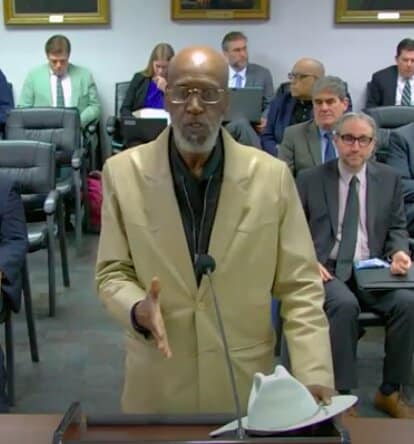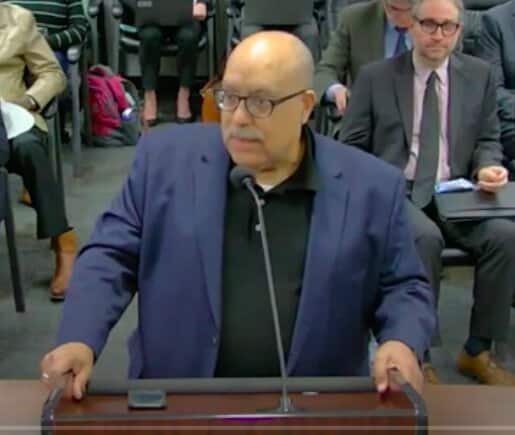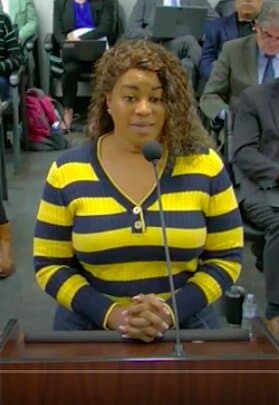From the coast to the capitol, Georgians are speaking out about Georgia Power’s proposed bill increases.
Cary Ritzler | November 29, 2022 | Energy Policy, GeorgiaGeorgia Power is currently proposing to raise customers’ bills by nearly $3 billion over the next three years. By itself, this rate increase would increase an average customer’s bills by about $16.29 per month in 2025, compared to their monthly bills this year. However, since this is just the first in a series of expected requests from the power company to raise customer rates, Georgia Power may end up charging customers $55 to $60 more per month on average by 2025, nearly a 45% bill increase compared to this year.
At the same time, Georgia Power is proposing to increase the amount of profits they can earn–effectively charging households to line shareholders’ pockets, and profiting off those who can least afford to pay. And, while asking for rate increases, the company continues to skimp energy efficiency and oppose fairly compensating customers with rooftop solar for energy they send back to the grid for their neighbors to use. In fact, rather than reinstate the solar program they pilot-tested after the 2019 rate case, the power company is proposing to charge solar customers an additional hookup fee just to connect their solar panels to the grid. In sum, between the rate increase and their regressive solar stance, Georgia Power is squeezing customers’ wallets and making it even harder to move into a clean energy future, in spite of their stated goal to reach net zero emissions by 2050.
But before Georgia Power’s proposals are made official, they must be approved by the state’s utility regulator, the Georgia Public Service Commission (PSC), which has held a series of hearings to evaluate the company’s proposals and gather input on the proposals from other parties.
During the first hour of each day of hearings in this rate case proceeding, the PSC allows public comment. I attended the hearing on November 10 and saw that Georgia residents went to great lengths to show up and speak about how the rate increases will affect them and their communities, and ask the PSC to take their role as consumer protector seriously. Public service commission hearings are streamed live, and recordings of past meetings are available on the Georgia Public Service Commission You Tube channel. You can watch the November 10, 2022 hearing and hear all public comments in their entirety by clicking here.
Some Atlanta-area residents addressed the Commission about the fairness of the rate case, how Georgia Power’s business practices have impacted families and households, and called on the Public Service Commission to take a strong regulatory stance on behalf of customers.
Neil Sardana, an Atlanta resident, encouraged the PSC to consider their position as consumer watchdogs: “We know Georgia Power has a significant amount of profit it makes in our state, as the largest utility provider and a monopoly utility…and that’s precisely why you exist: to reign them in and keep them under control.”

Mr. Tibbs, of Atlanta, pointed out that Georgia Power customers are “a captive audience” with no opportunity to shop for better rates, since all customers within the service area must use the same utility. He asked the PSC to use their position “give us some leniency,” which he said would help “us to move forward, with Georgia Power and the citizens interacting.”
Wan Smith, Organizing Director of Georgia Conservation Voters, noted that Georgia Power has recently settled a multi-million dollar lawsuit to compensate co-owners of Plant Vogtle for construction cost overruns. Since 2011, Georgia Power customers have paid $3.5 billion in mandatory tariffs to cover the cost of construction, and the company continues asking for rate increases to cover the escalating costs. Ms. Smith asked, “What about our lawsuit? The PSC is supposed to protect us,[…] a court thought there was so much mismanagement that [Georgia Power’s partners] were awarded 76 million. But instead of us canceling Vogtle […] we gotta consider raising rates.”’
Reverend William Flippin, Jr, pastor of the Lutheran Church of the Redeemer in Macon, spoke about the moral need to hold Georgia Power accountable to the people they serve, saying, “This is about a moral mandate that we all have as Georgians, a place that we love, and we will continue to rise up as a people.”
Many speakers showed up to speak on behalf of the members of their communities who could not be there themselves. Public comment is held in person for the first hour of each day of rate case hearings, usually from 9:30 to 10:30, in downtown Atlanta. As is often the case with PSC proceedings, it was impossible for many working Georgians to make the trip to speak to the PSC.

Former State Senator Vincent Fort, of Atlanta told the commissioners that he was, “Here speaking up for people who don’t have the opportunity to come down and speak for themselves…think of all those people who are going to turn down the thermostat. […] Tell [Georgia Power] that you are standing up for regular folk this time.”
Karima Hadifa, a community organizer and activist, said she was attending, “In representation of those who live below status quo…I feel like I’m pinching pennies every month just to survive out here with the job that I do have, but there are people who are not employed, there are people who…are just barely making it…I am imploring you all today to not raise the rate here in Georgia.”
Several Georgia residents also journeyed from Savannah and stayed in Atlanta overnight in order to get to the hearing on time.
Savannah resident, Chastity Malloy, asked the members of the Commission, “What does it cost if you were to vote no? As I understand it, Southern Company is in the black. Shareholders are happy […] this [rate increase] is going to have a detrimental impact on the regular person in the state. Knowing that this will be an additional increased burden on those folks that are already struggling […] say ‘not this time.’ It does seem morally irresponsible to put that burden on folks who are already struggling.”
Tia Brightwell, executive director of Through It All, a Savannah nonprofit focusing on educating youth, empowering women, and engaging families, brought her children Jamari and Donald of Savannah High School with her to the hearing. She told members of the commission that she wanted to speak on behalf of those in her community who could not make the drive: “We’re asking you nicely to not let this increase take place. I can speak on behalf of God, if you all serve him like I think you do, my family, and then my community. People who could not be here today, who could not drive three hours. Don’t let this increase happen, because we need you.”
Another Savannah resident, Chuck Eylor, spoke as a senior on a fixed income stating, “We are squeezing people who are already squeezed too far. I’m a senior on a fixed income. My question is–is this rate hike unconscious cruelty, or is it cruelty on purpose? Rate hikes are the wrong way to solve our problems here.”

Shamika Simmons, founder of Go Pink 365 in Savannah, asked the PSC to take a stand for the people of her community: “If you’re for the people–I need you to be for the people. 24% of Savannahns are in poverty. A rate increase for them is lights out for them. Do we really want that?”
What is the PSC?
The Georgia Public Service Commission is an elected body that regulates certain electric and gas utilities in Georgia. PSC decisions impact how Georgia Power will meet the electricity demand from customers in its monopoly service area. The PSC decides whether to approve plans and procedures for power plant closures (for example, when Georgia Power decides to retire old coal plants) and new power plant construction (for example, when Georgia Power decides to build a new nuclear power facility). The PSC also has a say in how much renewable energy Georgia Power pursues, how solar programs are structured, energy efficiency programs the Company offers, and whether rooftop solar is encouraged. As part of its regulatory activity, the PSC also considers whether Georgia Power’s proposed fees, rates, bill structures, and shutoff policies are fair to consumers, and whether to allow the utility to pass certain costs on to ratepayers.
What’s Next for the Rate Case?
The Public Service Commission will hold more hearings on November 29 and 30. Members of the public can sign up to speak for three minutes each during the first hour of each day of hearings. The PSC will continue to hear testimony from intervening parties, including SACE, and will deliver their final ruling on the rate case on December 20.
Make Your Voice Heard
The public can also submit written comments about the rate case online, to be shared with Public Service Commissioners and entered into the public record. The best time to make your comment is right now, but comments can be received up until the PSC makes its final decision, which is expected by December 20. Please feel free to reach out to cary@cleanenergy.org if you would like help submitting comments, and see the link below for more information.
Click here to submit a comment!
Click here to get involved with the grassroots Renew Georgia campaign!